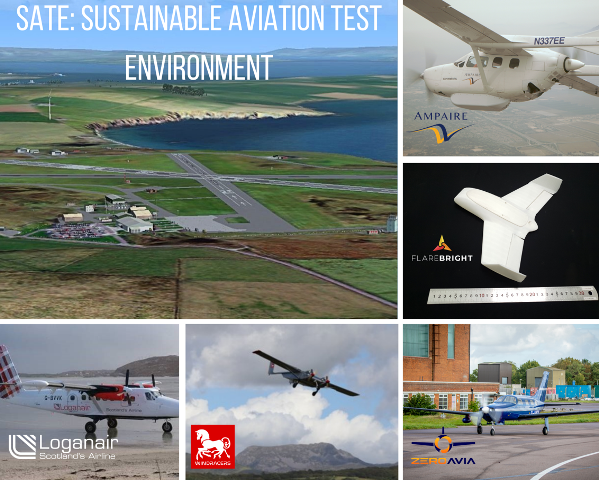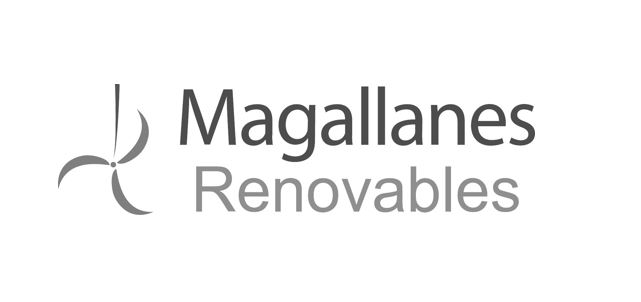Press release: Orkney to become Sustainable Aviation Test Environment

Kirkwall Airport and the host of technologies to be demonstrated through the Sustainable Aviation Test Environment project (Courtesy of SATE)
Highlands and Islands Airports Limited (HIAL) has embarked on a £3.7 million project to develop a sustainable aviation programme that could transform short flight travel between remote communities.
Part funded by UK Research and Innovation (UKRI) through the Industrial Strategy Challenge Fund, the SATE (Sustainable Aviation Test Environment) project will create the UK’s first operationally-based, low-carbon aviation test centre at HIAL’s Kirkwall Airport in the Orkney Islands.
Launched as part of UKRI’s Future Flight Challenge which supports the development of greener ways to fly, the project will operate for an 18 month period.
Different types of low-carbon aircraft will be tested to identify the next generation of air services as well as the operational airport infrastructure necessary to support sustainable aviation.
Addressing the challenge to improve UK regional air connectivity and helping to decarbonise the Highlands and Islands region, the innovative project will stimulate job creation and use local renewable energy, supporting Orkney’s net zero ambitions.
Led by HIAL, the SATE project brings together a consortium of aviation industry specialists, local Orkney and Caithness businesses, public sector bodies and academia.
SATE’s technology partners — Ampaire, ZeroAvia, Loganair, Windracers and Flarebright — will trial a host of exciting new transport options. This will include testing low-carbon aircraft using electric, hydrogen or Sustainable Aviation Fuels (SAF) to replace conventional fossil fuels, as well as drone applications for supplying on-demand medical supplies to health centres.
Consortium members will also look at how to implement zero-carbon airport infrastructure using green energy sources, as well as digital networking and the development of resilient communications. The socio-economic impact of new technologies and services in the region, and the skills and training needed to support them, will be assessed.
The European Marine Energy Centre (EMEC), Denchi Group, Orkney-based Cloudnet, Air Service Training, University of the Highlands and Islands, The Highlands and Islands Transport Partnership (HITRANS), Highlands and Islands Enterprise (HIE), and Orkney Islands Council complete the partnership.
As an exemplar early-adopter of other low-carbon technologies, Orkney is an ideal ‘living laboratory’ for testing aviation and aerospace technology. Kirkwall Airport is well suited as a test environment location due to the variety of short routes it offers acting as a hub connecting Orkney’s island communities through its inter-island flight service.
HIAL Managing Director Inglis Lyon, said:
“Project SATE will place the Highlands and Islands at the vanguard of the adoption of next-generation aircraft and spearhead the aviation industry’s response to climate change.
“The project will identify the necessary supply chain and people skills to support the development and testing of the new technologies, with the aim of developing a Highlands and Islands sustainable aviation sector, stimulating inward investment and local supply chain opportunities.
“It will also measure local community appetite for the new aircraft technology, especially on lifeline regional routes, and the potential impact on the regional economy from the adoption of these new technologies.”
Scottish Government Cabinet Secretary for Transport, Infrastructure and Connectivity Michael Matheson, said:
“This is a very exciting project and it’s fantastic to see Highland and Islands Airports Ltd take the lead to create the UK’s first low-carbon aviation test environment.
“This test centre has the potential to put Scotland at the forefront of the transition to low carbon aviation and is an important step towards delivering our commitment to decarbonise scheduled passenger flights within Scotland by 2040.“
Gary Cutts, Future Flight Challenge Director, said:
“At this challenging time for the international aviation industry, it is a great testament to the UK’s drive and ambition that we had such a strong response to the first funded Future Flight competition.
“The breadth, quality and creativity of the bids has been exceptional and the economic and social benefits offered are significant.”





